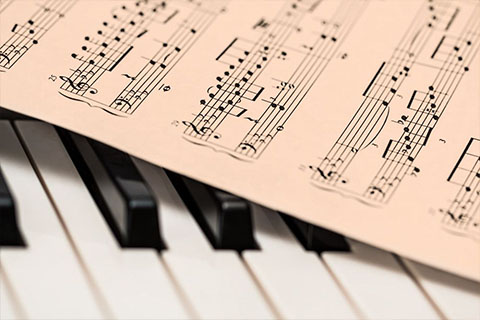Over the past two and a half years of learning the piano I have done three classical piano performance grades with Trinity and I’m nearly half way through the studies for my fourth.
I have really good notes on how much time I spent at the piano and so I thought I would write down my thoughts on how much work you need to put in in order to grab a distinction or even a 100% result on the exams.
Total Qualification Time
Trinity describes the time you need to put into each grade using the term Total Qualifying Time, calculated as:
Guided Learning Hours (time spent with your teacher)
x
Independent Learning Hours (time spent practicing by yourself)
| Grade | Guided learning hours (GLH) | Cumulative GLH | Independent learning hours (ILH) | Cumulative ILH | Total qualification time (TQT) (hours) | Cumulative TQT |
| Initial | 8 | 8 | 32 | 32 | 40 | 40 |
| Grade 1 | 12 | 20 | 48 | 80 | 60 | 100 |
| Grade 2 | 18 | 38 | 72 | 152 | 90 | 190 |
| Grade 3 | 18 | 56 | 102 | 254 | 120 | 310 |
| Grade 4 | 24 | 80 | 126 | 380 | 150 | 460 |
| Grade 5 | 24 | 104 | 156 | 536 | 180 | 640 |
| Grade 6 | 36 | 140 | 184 | 720 | 220 | 860 |
| Grade 7 | 48 | 188 | 222 | 942 | 270 | 1130 |
| Grade 8 | 54 | 242 | 266 | 1208 | 320 | 1450 |
Are TQT numbers accurate?
In a word, yes. Uncannily so.
I did not look at the TQT numbers relative to my own performance until after I received the results from my Grade 3 exam. I practiced for each grade until my teacher told me I was ready, and then some more until I felt I was ready.
In other words I did not practice the recommended number of hours deliberately – but it turns out I did by chance (well, Trinity probably know a thing or two about how long it takes to learn to play at a given level 😃).
Let’s look at my practice hours for each grade relative to time spent:
| Grade | Trinity TQT | My Actual Hours | % of TQT Studied | Grade Received |
| Grade 1 | 60 | 83.10 | 138 % | 100 / 100 |
| Grade 2 | 90 | 89.88 | 99.8 % | 100 / 100 |
| Grade 3 | 120 | 83.40 | 69.5 % | 93 / 100 |
There are a few interesting things in this:
- I studied approximately 70% of the recommended time for grade 3 and received a 93% grade. When you consider getting 100% is all about diminishing returns of polishing and polishing, this makes a lot of sense.
- It is astonishing to me that I independently chose to spend 99.8% of the time Trinity recommended before submitting my Grade 2 performance exam.
- I short changed myself on practice for Grade 3 (mostly out just being sick of the whole thing) and that was reflected in the result.
- Regardless of grade, I appear to have spent an almost identical number of hours on each grade.
Given I was sick of grade 3 at ~70% of the TQT hours required, Grade 4 is going to be a slog.
Moving forward I will be using the TQT numbers as a practical minimum I will study, regardless of how fatigued or fed up I am.
Activity Breakdown
Trinity grades you out of 100 marks. The digital performance exams are made up of the following components:
| Component | Weighting |
| Pieces These are the pieces you play. Each is worth 22 marks. | 66% |
| Technical Work You select two technical exercises from six options available. You are also expected to play some scales and arpeggios. | 14% |
| Performance Delivery and Focus Do you look professional and like you know what you’re doing? How well are you transitioning between pieces? Are you focused and committed to what you’re doing? | 10% |
| Musical Awareness How is your musicality? Are you playing within the style of the given pieces? Do you demonstrate musical personality? | 10% |
I didn’t record my time in a way that lets me directly map to these scoring areas so I have to roll a couple of them up. This table compares the time I spent as a percentage of the total time I spent on that grade against the weighting. The variance is not how much more or less I studied for the given area, but how much I studied relative to how many marks it was worth.
| Grade | Area | Weighting | % Studied | Variance |
| 1 | Pieces | 66% | 78% | +12% |
| 1 | Technical Work | 14% | 9% | -5% |
| 1 | Performance Delivery and Focus + Musical Awareness | 20% | 13% | -7% |
| 2 | Pieces | 66% | 73% | +7% |
| 2 | Technical Work | 14% | 9% | -5% |
| 2 | Performance Delivery and Focus + Musical Awareness | 20% | 17% | -3% |
| 3 | Pieces | 66% | 70% | +4% |
| 3 | Technical Work | 14% | 15% | +1% |
| 3 | Performance Delivery and Focus + Musical Awareness | 20% | 15% | -5% |
I adopted a habit from the first grade of practicing the entire program as if I was recording it and really trying to put myself in the mental frame of being assessed. I spent 10, 12, and 13 hours doing this for grades one, two, and three respectively. I recommend doing this as a dedicated activity in the run up to your actual performance exam.
Final Words
I probably should not be as surprised as I am that the metrics Trinity provides are accurate. They have been at this a long time and it is their business.
I should also point out that I do a lot of study and pieces unrelated to Trinity while I am studying for Trinity. That is no doubt a big help in the exams and general musical comprehension, but I left it out of these figures as it is impossible to understand how much learning some contemporary classical piece has or has not helped me understand a Baroque period piece.
And probably the least surprising thing is that excellent results are from a concomitant amount of practice.

